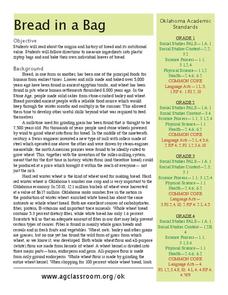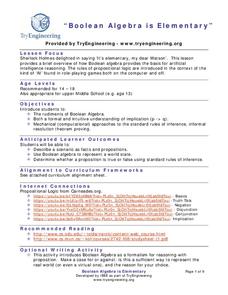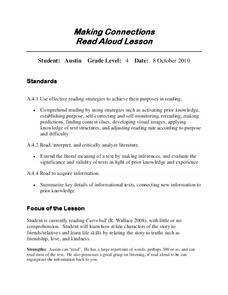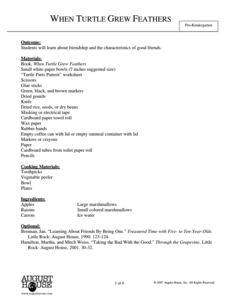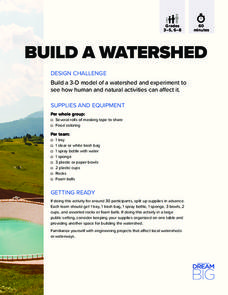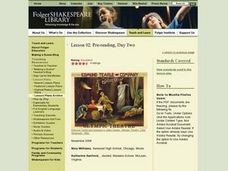Curated OER
Bread in a Bag
Could the history of bread really be interesting? Yes, it could! An informational text gives scholars wheat production background from 8,000 years ago, discussing different types of bread and the current industry in Oklahoma. Learners...
TryEngineering
Boolean Algebra is Elementary
See how Boolean algebra relates to video games with a lesson that teaches young scholars how to use Boolean algebra to create rules for a virtual world. They test the rule base for consistency in groups.
NOAA
The Oceanographic Yo-yo
How does chemistry help deep-sea explorers? Part four of a five-part series of lessons from aboard the Okeanos Explorer introduces middle school scientists to technologies used in ocean exploration. Groups work together to analyze data...
Curated OER
Gus and Grandpa and the Two Wheeled Bike: comprehension skills
What a fantastic idea! Give these bookmarks to your readers to help them conquer pages 206-222 of Gus and Grandpa and the Two Wheeled Bike. They make inferences, conduct close reads, search for cause and effects, and focus...
August House
The Great Smelly, Slobbery, Small-Tooth Dog
Read the story The Great Smelly, Slobbery, Small-Tooth Dog: A Folktale from Great Britain by Margaret Read MacDonald and choose from multiple activities to learn about the tale's theme—kindness. With so many options, your kind kids will...
Science 4 Inquiry
The Ups and Downs of Populations
Life has its ups and downs ... especially if you're an animal! Biology scholars engage in a population study through an inquiry-based lesson. Pupils work together to explore the factors that affect deer populations, then examine the...
EngageNY
Mid-Unit Assessment: Evidence and Inference in Pygmalion
Scholars complete the Pygmalion mid-unit assessment to show their progress toward the unit's stated goals. The assessment requires learners to read text and successfully answer multiple choice and extended response questions.
Curated OER
Lesson Three: Strategies to Infer
Third graders make inferences with a text. In this inferring instructional activity, 3rd graders read Town Mouse Country Mouse by Jan Brett and they discuss the differences between city and country life. They make inferences as they...
Curated OER
Making Connections
Fourth graders investigate visual imagery to aid reading comprehension. In this reading strategies lesson, 4th graders discover how visual imagery helps in comprehending a story. Students use a reader's notebook to record connections.
Ohio Department of Education
Observe Then Infer
To develop their skill at drawing inferences from observations, sixth graders rotate through six stations, conduct a series of experiments, make observations, and draw inference from what they observe.
NOAA
Journey to the Unknown
What's it like to be a deep-sea explorer? Tap into the imaginations of your fifth and sixth graders with a vivid lesson, the second part of a six-part adventure. Learners close their eyes and submerge themselves in an expedition aboard...
K5 Learning
Queen Hulda and the Flax
Choosing humility over outstanding wealth can be beneficial in the long run. Elementary pupils practice reading comprehension with a short fairy tale about Queen Hulda and her gifts to a poor shepherd, and demonstrate their...
EngageNY
Comparing Meaning and Tone: The Fall of Saigon in Fiction and Informational Text
Who's that talking to? Readers listen to a reading of the "Forgotten Ship" transcript and answer questions focusing on word meaning and choice. They complete a chart to track the multiple narrators in the script. For homework, readers...
C-SPAN
Choice Board: Expressed and Implied Powers
Article 1, Section 8 of the United States Constitution expressly lists powers given to Congress. Over the years, lawmakers have expanded the enumerated powers to include powers implied by the list. To better understand the significance...
Towson University
Case of the Crown Jewels
Can your biology class crack the Case of the Crown Jewels? Junior forensics experts try their hands at DNA restriction analysis in an exciting lab activity. The lesson introduces the concept of restriction analysis, teaches pipetting and...
August House
When Turtle Grew Feathers
Friendship is a valuable part of growing up. Learn about the importance of friendship with a variety of activities based on When Turtle Grew Feathers by Tim Tingle. Kids practice making musical instruments, discussing plot points,...
Physics Classroom
Charge Interactions
Has your class been repelled by your previous magnetism lesson plan? Try a fun interactive instead! The activity, part of the Static Electricity series, challenges scholars to infer the charges of a group of magnets based upon their...
DiscoverE
Build a Watershed
What's the best way to learn how watersheds work? Build one! Combining engineering, the water cycle, and ecology concerns, the activity is the perfect fit for an interdisciplinary unit. Teams construct a model watershed with simple...
Curated OER
Call It a Hunch
Give young scholars a chance to practice making inferences after reading the book Through My Eyes by Ruby Bridges. They confirm whether or not their conclusions are true, have a class discussion, and then independently complete an...
Have Fun Teaching
Who Am I? (14)
What's the difference between a clown and a cashier? Use context clues to infer what each character does for a living in five different reading passages. Kids mark their choices on the space provided.
CPALMS
Analyzing Vonnegut's View of the Future and His Commentary on the Present in Harrison Bergeron
Kurt Vonnegut's short story "Harrison Bergeron" engages adolescents with its theme about the dangers of complete societal equality. Learners complete a graphic organizer to track literary elements in the story, as well as an inference...
Curated OER
Analyzing Atmosphere: Macbeth Murder Scene and Dagger Speech
Shakespeare's Macbeth (Act II, Scenes I and II) lacks explicit details of the murder of King Duncan, yet the author creates an atmosphere that allows us to visualize the event. Readers interpret the "Dagger Speech" by writing stage...
Curated OER
Shakespeare: Julius Caesar
Before your high schoolers read Julius Caesar, have them complete this thought-provoking activity! To familiarize them with some of the play's most important lines, break the class into pairs and have them create a skit around...
Curated OER
Guided Reading: Asking Questions
Here is a reading strategies lesson in which learners use post it notes to create a bulletin board. They post their new questions on the bulletin board and look back at questions they have already learned the answer to. A great idea,...


